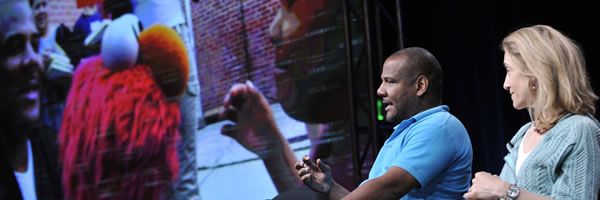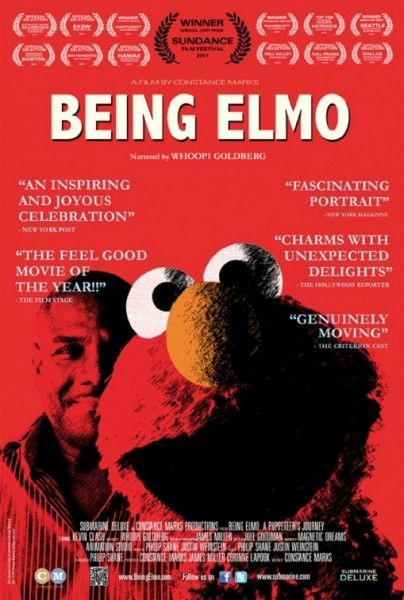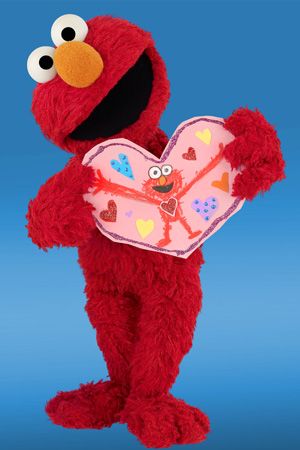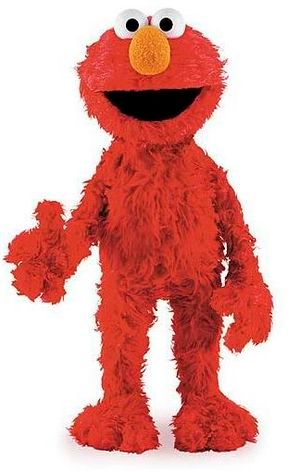Elmo is an international icon, but few people know the inspiring story of his creator, Kevin Clash. The documentary Being Elmo: A Puppeteer’s Journey, opening on October 21st in theaters and then premiering on PBS in Spring 2012, tells the story of someone who displayed his creativity and talent from a young age. Dreaming of working with his idol, master puppeteer Jim Henson, he ultimately found a home on Sesame Street, where he has been making children and their families happy, ever since. Narrated by Whoopi Goldberg, the film includes rare archival footage, a behind-the-scenes look at Sesame Street and the Jim Henson Workshop, and a showcase of just how much those lovable characters mean to people of all ages, all over the world.
During this exclusive interview with Collider, puppeteer Kevin Clash talked about how the documentary came about, that the dream of being on Sesame Street started when he was nine years old, how honored he was to work alongside Jim Henson and continue his legacy, how quickly the personality and voice for Elmo came to him, the responsibility of fulfilling a last wish for a sick child, and how fun it was to be a part of the return of the Muppets, voicing a character for the new feature film. Check out what he had to say after the jump.
How did this documentary come about for you?
KEVIN CLASH: James Miller was a camera man, years ago, with Sesame Street. And then, he went off and did all the different things that he directed. Then, he came and did a couple of days camera work again on Sesame Street and said, “Listen, my daughter is two years old. I’d love to video tape you looking at some pictures of her with Elmo.” So, I did that, and he took it home and showed it to (director) Connie [Marks], and she went crazy over it. She said, “You know what? Maybe this would be a good documentary, to do something on the performer of Elmo.” So, they brought it up to me, and I met with her and we sat and talked about it. I had just done a book (called My Life as a Furry Red Monster), and it was really fun to reminisce about all of the different things that I’ve gotten to do. But, there was no room for pictures in it, so I thought this was a great opportunity to talk about what I love doing, visually, which I thought was fun.
Do you find that people tend to forget, especially when you’re with the puppets, that there’s actually a person behind them?
CLASH: Well, that’s what you’re supposed to do. That’s the illusion.
Do people always ask you to do stuff for their kids, as Elmo?
CLASH: Yes, but I really enjoy it. We all do. All the puppeteers enjoy it ‘cause it’s a part of what we do. We’re flattered by it, actually. I think it’s sweet. It is for children, so that’s what’s nice about it. You’re giving something to their children.
And because everybody grew up watching Sesame Street, don’t you find that adults feel like kids again, around the puppets?
CLASH: Yeah. If everybody came to Sesame Street, they’d turn into five-year-olds. They’d reminisce about what they loved about it, and be looking forward to seeing Oscar or Big Bird coming down the Street. It’s a very comforting, very safe place.
Where did the dream of doing Sesame Street start for you?
CLASH: When it started, it was 1969 and I was nine years old. Just as soon as it came on, I was glued to the TV. I loved watching the show, but I also wanted to get as close as I could to the TV to see how to build the puppets.
Was there a moment when you realized that you could make a career out of being a puppeteer?
CLASH: I didn’t really think of it as a career, when I was that young. I went back and forth from building puppets to drawing characters and maybe wanting to get into animation, at that age. And then, I gradually started doing it more, locally. My mom would say, “You know, you could probably do this as a career,” but at that point, I was making $25 a show and it was more just the enjoyment and the fun of doing it. It was more of a dream, definitely.
Did that encouragement you got, after making your first puppet, really help further the dream for you, or were you determined enough to do it, even without that?
CLASH: I think I was determined enough. It always helps to have the support of your family. That’s icing on the cake. Sometimes people don’t have that, unfortunately. Fortunately, I did and it’s made me a better person for it, but I think I still had the drive to try to do it.
When you had fights with family members or people who didn’t understand what you were doing, did that push you to keep going with it to prove them wrong? And, did they change their opinion once you started to have success with it?
CLASH: Oh, everybody started to change their opinions. It wasn’t, “Oh, I’m going to do it, in spite of you.” I just really didn’t pay that much attention. I knew it was said, but it didn’t really weigh anything for me. I just knew what I wanted to do, so I never cried about it. I remember there was this whole thing in school, where they looked at some kids that weren’t going with the crowd. Teachers asked some of the students why they weren’t going with the crowd, but the answer was really, “We’re not emotionally connected to that.” That’s somebody scared that they’re not fitting in with everybody and doing the same thing. The kids that they talked to didn’t really have an emotional connection to that. They were more driven by what they wanted to do, or what they felt. In certain ways, you could say that came from my mom and dad. They were very open about everything. I’ve heard some puppeteers where their parents said, “Why are you doing this? You’re not going to make any money. Why not be a doctor or lawyer, or something like that?” And, they really didn’t support them. It’s a concern for any parent, that their children can make a living and take care of themselves. But, my parents just said, “This is something that you really enjoy doing, and you might be able to make a living with it.”
When you finally learned how the puppets actually worked, was there anything that most surprised you?
CLASH: Not really. It just was an instinct that kept happening. I would watch and pick up on it, and just became a sponge. I was more fascinated by the things I couldn’t get my hands on, like fleece and different types of foam. That’s when getting to the workshop and seeing all that stuff excited me. I was like, “Man, they have everything here! I can’t get half of this stuff in Baltimore.” They trouble-shoot building these characters, and have done that for so many years that they have it down, as far as what materials might work and might not work, for building something. It wasn’t just one brain, like I was doing in Baltimore, trying to figure it out. They had people collaborating and saying, “Why don’t we choose this material? Let’s see if this works.”
When did you realize that you had actually made it? Do you remember the moment that you figured it out?
CLASH: Yeah, it was actually with Elmo. I had gotten the character thrown to me by this unbelievable, talented performer, called Richard Hunt, who was one of Jim’s main puppeteers. He was the second puppeteer to perform Elmo on Sesame Street. I was an up-and-coming, young puppeteer, and I said to myself, “If he can’t do anything with it, how can I come up with something?” So, I went back home and hung up out with my mom, who was a daycare mother, and I watched the kids. When I came back up the next season, there was this one sketch that was written for Elmo that was just Elmo imagining that he was going on a trip, and I started doing some silly things. Once I heard the camera guys, who have seen everything, start laughing, I thought, “Okay, maybe I’m doing something that might work here.” That’s how I knew that there was something. It’s the same thing when you hear it from comedians. The first time that they get the laugh of some joke that they’ve said, they get the confidence of continuing it. It was the same thing with me.
What are your memories of the first time that you walked onto the Sesame Street set?
CLASH: I remember that I went in to audition for Snuffy, and I was blown away. I remember the polaroid that was taken of me and Big Bird, and you could just tell that I was that three-and-a-half-year-old, first seeing that show. I’m a puppeteer, and I was standing beside Big Bird just blown away.
How was it to meet Jim Henson? What impression did he leave on you?
CLASH: The thing is, Jim was all about having fun and creating and collaborating, and getting a group of people to do that with. He knew that it could not happen with just him, so he was very respectful of everybody. Growing up and wanting to work with somebody like him, and then having the opportunity, I always felt a little intimidated, but I was also very honored that he saw that I had the ability to do it. He gave me a lot of opportunities, fortunately. What he really taught me was truly what a boss should be. A boss should be respectful of everybody. He should still make sure everybody knows that he is the boss, without having to say it 24/7, but by him approaching you in a way that led you to know that you mean something to the company. That’s a phenomenal boss. He taught me really what a boss should represent in a company, especially if you want to be successful. I always say to a new puppeteer, “Don’t sit in the muppet room, waiting to go on. Go out and learn your craft and watch. There’s where the teaching is, not sitting in the room and waiting to go on, or looking at a monitor and watching it happen. You have this wonderful opportunity.” Fortunately, Sesame Street is still around for up-and-coming puppeteers to see that and be around it.
Once you had Elmo, how quickly did you find his personality and voice?
CLASH: The personality and voice was right there, but somebody had to approve it. So, once I came up with the voice and everything, I went into one of the executive producers of the show, at that time, and she said, “Sounds good to me.” That’s the way it happened. If it didn’t work, they would say something, but it worked. It was right, so that’s the way it stayed.
In all the puppets that you’ve done, do the voices and personalities always come that quickly?
CLASH: Sometimes it does. It really depends. I don’t think it happens, every time. Sometimes you have to develop it and work on it. When Jim and Frank [Oz] were trying to figure out who was going to do Ernie and Bert, Jim had Bert and Frank had Ernie. They did it a couple of times, and then they said, “Why don’t we switch it up?,” and that was it. Sometimes it can be a process, where you think you’re right for one character, but you’re not, and you’re right for the other. That definitely happens. A lot of times, even with Pixar, they have a person in mind when they start designing a character. Jim did the same thing. If there was a group of characters and he knew the characters, he would think of specific people for the characters. That’s what happened with Fraggle Rock. He sat around with all the puppets on the table and all the puppeteers, and had specific people try specific characters, to see what happened, and then they switched around. You know when it sounds right.
With so many big celebrities that come on the show, what’s that experience like?
CLASH: It’s always special. It’s always fun ‘cause they always have their stories. They want to tell you their experience because the show has been on for so long. It’s really nice to hear them reminisce about something that was, and still is, a special time in their life, which I think is great. There isn’t any other show like that, unless The Ed Sullivan Show would come back. It’s a staple, and it’s a very legendary show now, so everybody has their personal story about it, which I think is really sweet.
Is there anyone you were most excited or nervous about working with?
CLASH: No, I never ever really get nervous about that. It’s always about the character and playing around. I’ve never been nervous. I just wanted to play and have a good time. If it didn’t work, then I would get nervous. But, for the most part, I just go for it. Either there’s a connection that happens, or not. Nine times out of 10, I normally find some type of connection that works, and then it becomes really fun.
What’s it like to have the immense responsibility of a sick or dying child wanting to meet Elmo for their last wish?
CLASH: It really comes from taking yourself totally out of the equation. That’s with any child that wants to meet their friend. It’s just more specific because of what the circumstance is, when there’s a Make-A-Wish child, or somebody where that’s their final wish. Sometimes it can be challenging. It depends on where the child is at, physically. With some kids, you can’t tell that they’re sick, but there are some kids that you can, and that’s the hard part. You really have to push to just say, “Okay, this child is a child, and she wants to have a play date with her friend.” So, you focus on that and you have a really good time.
There was a beautiful little black girl that came in one time, and they said she only had a week or so, and she was not respondent. So, I put Elmo by her and we sang some songs, and Elmo just said, “Elmo loves you,” and her mom started crying because she saw a little smile come over her. It’s these wonderful moments, and it happens around the world. It’s amazing! Make-A-Wish is a wonderful organization. I remember being in Australia and meeting this 12-year-old girl that was in a wheelchair, and it was so much fun. It’s always a special time, especially for the child and their parents, but also for us, who can give that. It’s always a special moment, and it also can be very emotional too, but we deal with that afterwards. We don’t do that there. We keep specific about what we’re there to do, which is for them to have some time with their friend. We take ourselves out of the equation, which can be very difficult, but we have to.
The thing that gets us to our heart is the parents. We know what they’re going through, and they’re trying to be troopers, but nobody ever wants to have a sick child. They know what this means to their child. Thank the Lord for all of those organizations that do that because it’s a really special, beautiful thing. I fly somewhere and there was the cutest little blonde girl, and her grandparents and parents were there, and that play date went on for an hour and a half, until she got tired and went to sleep. It was hysterical. They sang to each other, they hugged each other, they laid on each other. It was the cutest thing, and she didn’t look at me, whatsoever. I was being dragged around like crazy. Everybody had a great time. But, that can happen with a sick child or a healthy child. It’s one of those shows.
What the performers love about it is that, since the show is so popular and the characters are so loved, when something like 9/11 or Hurricane Katrina happens, we can do something. We’re right there saying, “What can we do? Where can we go?” They charted a bus for us to go down for Katrina, and underneath the bus was filled with Fisher Price toys. We had no puppet stage. We just went in and sang songs to these kids. With 9/11, they had to relocate so many kids from those schools down there, and some of them had lost parents, so we did the same thing. There’s not that many shows that you can do that with. That’s another reason why I wanted to do the documentary. I wanted to talk about the enjoyment, over so many years, of a puppeteer’s journey. It’s the same story. It’s a celebration of what we do, and a love of what we do. We wanted to talk about the enjoyment of it. I hope that people get that, when they watch it.
How involved are you with the Elmo toys?
CLASH: All of the audio that you hear of Elmo on the toys is me. I’m more involved now because I’m really more involved in trying to get fun music through the audio toys. But, in the beginning, I wasn’t. Normally, they would just have me come in and do nine audio toys. My lawyer goes through all of the negotiations with this stuff, and at one point of our negotiating, he said, “I can’t believe I’m negotiating for Elmo. What a job.” About a week or two after I did Tickle Me Elmo, I got calls saying that it was going to be the #1 selling toy at Toys-R-Us for Christmas. And then, analysts said it was going to be the #1 selling toy for Christmas, period. I had no idea. I’m a puppeteer. But, it was wonderful to be a part of it because it was used for a lot of different charity events. And, it keeps everybody knowing and loving the show, which is great.
What are some of the characters you’ve done that just didn’t work?
CLASH: There’s one in the documentary called Ferlinghetti Donizetti, that rhymed all the time. He was very beatnik. There was a bunch of characters. There was a Professor D. Rabbit. Those were the days where I really thought, “Oh, my goodness, I’m going to get fired any day now.” But, it’s a process with me. Hoots was early on. There was a news reporter/anchor called Warner Wolf. He had a trench coat. But, it didn’t work. Fortunately, I found something that worked, so I’m happy for that.
Are you coming up with any new characters that you are going to bring to Sesame Street?
CLASH: You know, that always happens. Every year, there are some character that comes out. We are always doing and developing different things. But, we really try to keep the core of those characters and not muddy it with too many characters. If they work, they work, and you see them again. If it doesn’t work, we come up with something else. But, that always happens on Sesame Street.
Having achieved this dream for yourself, what would you say to other people like you, who have big dreams?
CLASH: Do it! Don’t let any obstacles get in the way. You’ve gotta be realistic about it, but really, if you have a passion, go for it. If you’re an adult, be realistic, but don’t let that realization go to where you just can’t do it. If this is something that you know is going to make you happy, do it. Do it until you feel as though it can’t happen. Just do it! That’s all I say.
Was it fun to get to voice a character for The Muppets, and to bring that back to the big screen for new audiences?
CLASH: Yeah. With Sesame Street, that’s never gone anywhere. The Muppet Show went off the air, so a lot of generations of kids don’t know those characters anymore. That’s why it’s going to be great for the movie to really get that audience again, which I really think they’ll be able to do. That should be fun. Sesame Street has been on, going onto 43 years, and is still totally relevant. Just as long as things happen in TV and in movies, we’re going to grab onto it and see what we can do to spin it, by teaching and entertaining, which is fun.




